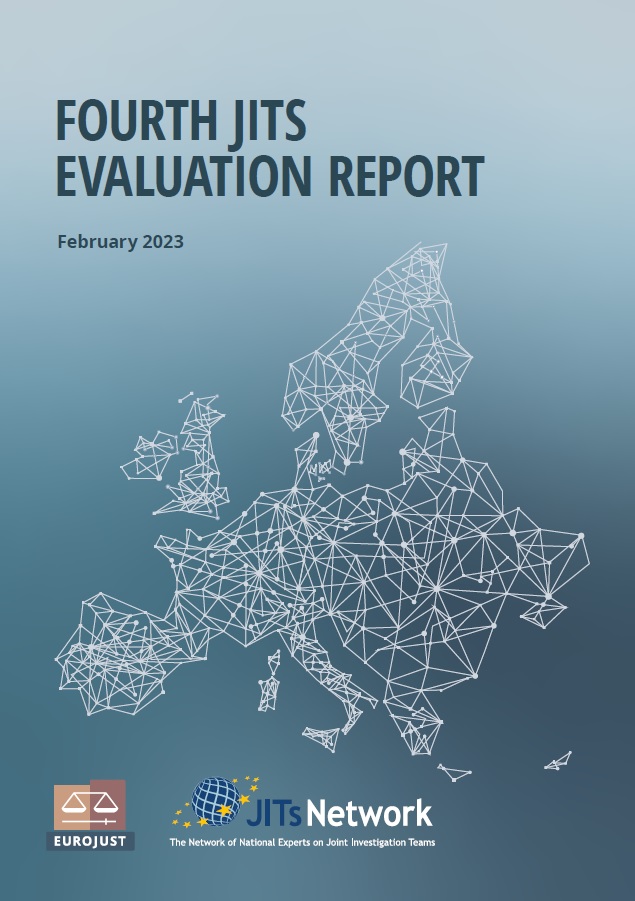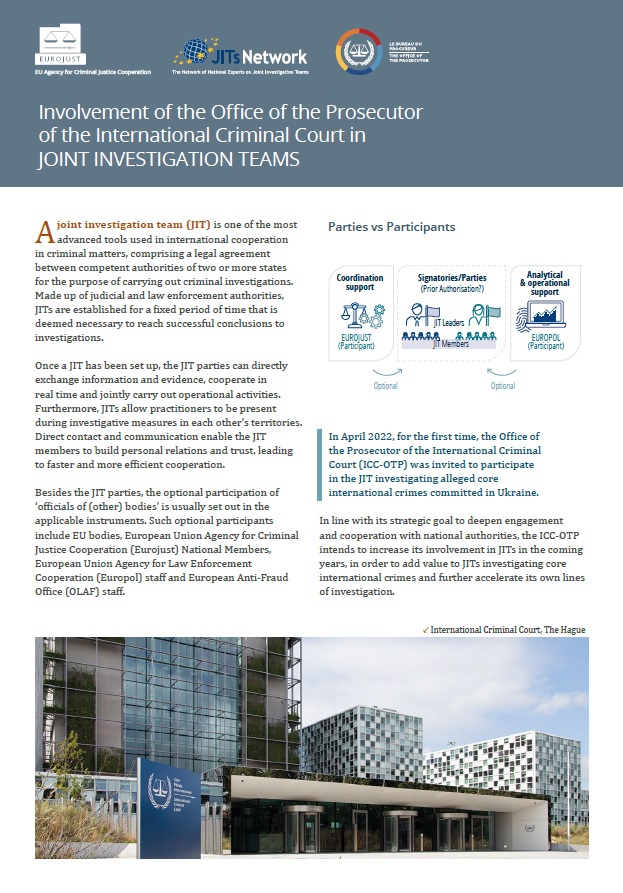In 2023, Eurojust awarded 257 grants to 132 JITs under both the standard and urgent funding schemes. Of these, 51 JITs were established in 2023. The final budget earmarked for JIT funding in 2023 was EUR 1.942 million.
During 2023, the JITs Network Secretariat worked on simplifying the reimbursement process for funding beneficiaries through a new IT tool. The Claims Module, launched in December 2023, is an online tool for beneficiaries to submit their JIT funding reimbursement claims. The online tool is part of the JITs Portal and is also accessible to non-EU countries. The deployment of the first stage of the Claims Module was completed in 2023, and further technical improvements and functionalities will be introduced in 2024.
To help practitioners fully understand the processes involved in the JITs funding programme, a list of frequently asked questions was added to the Eurojust website in 2023 to provide answers to common questions and issues. Moreover, a JITs funding guide for participants from the Western Balkans region was also published in December 2023 and translated into Albanian for training purposes through the Western Balkans Criminal Justice project (see section 5.3).
19th Annual meeting of the JITs Network
The 19th Annual Meeting of the Network of National Experts on JITs took place in October 2023 and explored how to step up judicial and law enforcement cooperation between EU Member States and Latin American countries in the fight against serious organised crime. Latin American criminal networks play a major role in drug trafficking and often collaborate with EU-based criminal groups. To tackle this growing problem, practitioners explored the possibilities of establishing JITs with Latin American countries.
Prosecutors from Italy, Brazil and Chile presented case examples of successful judicial cooperation and shared their experiences on recurring challenges and best practices. Participants also discussed promoting joint initiatives such as common projects and training programmes to enhance cooperation.
During the dedicated workshop on ‘supporting JITs with Latin American countries’, participants underlined the importance of Liaison Prosecutors and Contact Points as key to facilitating judicial cooperation with Latin American countries. Efficiently establishing contacts with the relevant authorities in Latin American countries was highlighted as a crucial first step in establishing cooperation. Participants suggested creating model agreements, checklists and guides for setting up JITs as well as thematic workshops and seminars to raise awareness in this particular field of judicial cooperation.
Other key topics were addressed during a series of workshops, including one dedicated to the ‘procedural rights of victims within the context of JITs’. Participants discussed how to promote the victims’ rights dimension more systematically when discussing prosecution strategies in the context of JITs (see section 4).
Fourth JITs Evaluation Report
The Fourth JITs Evaluation Report, published in June 2023, provides an overview of lessons learned and best practices, as shared by JIT practitioners. The report also focuses on Eurojust’s experience with multilateral JITs, recent developments in JITs, and JITs-related case-law. It is based on 82 evaluations completed by JITs practitioners between 2019 and 2022. A complementary checklist for multilateral joint investigation teams was also published to assist practitioners in setting up and operating complex JITs involving several countries.
Report on the Assessment of the JITs Network and its activities
The Report on the Assessment of the JITs Network and its activities, published in December 2023, reflects on various aspects of the JITs Network’s operations. These include the functioning of a JIT National Expert in their Member State; relations and cooperation with Eurojust; JITs Network meetings; and the training of JIT National Experts. The report aims to improve the overall level of engagement and functioning of the JITs Network and provides an insight into JIT National Experts’ experiences, fields of expertise and expectations regarding their role and tasks. The action plan outlined in the report proposes future improvements and goals for the Network.
Involvement of the International Criminal Court in JITs
Following the International Criminal Court’s first involvement in a Eurojust-supported JIT (see section 2.1), the JITs Network Secretariat facilitated contact between the Office of the Prosecutor of the International Criminal Court (ICC-OTP) and the JITs Network, which resulted in the ICC submitting a formal request to become an Associate Partner to the Network. The JITs Network granted the ICC-OTP Associate Partner status in July 2023.
Furthermore, the JITs Network Secretariat and the ICC-OTP published a joint factsheet presenting the ways in which the ICC may be involved in JITs, the benefits of its involvement, and the support that Eurojust and the JITs Network Secretariat can offer to JITs in which the ICC-OTP is involved.
JIT Collaboration platform
During 2023, the JITs Network Secretariat, supported by Eurojust, worked closely with the European Commission and its contractor to draft a business study for the development of the JITs collaboration platform, which aims to improve and make JIT cooperation more efficient between countries (see section 2.2).
Training activities
Throughout 2023, the JITs Network Secretariat organised a large number of training activities for JIT practitioners both at the regional and international levels. The Secretariat provided coaching at seminars on JIT leadership in April and on JIT implementation in September, co-organised by ERA, CEPOL and EJTN. During the JIT implementation session in September, the JIT model case scenario (developed in 2022) was used for the first time, and suggestions for improvement were discussed. The Secretariat also actively participated in various meetings organised by the Western Balkans Criminal Justice and EuroMed Justice projects. In addition, it participated in numerous study visits of delegations from both EU and national institutions as well as third countries hosted by Eurojust.
An award-winning JIT
Eurojust worked with judicial and law enforcement authorities in Latvia and Ukraine in an investigation concerning the kidnapping and murder of a Belarusian citizen. To facilitate cross-border judicial cooperation between the authorities, Eurojust supported the establishment and funding of a JIT and five coordination meetings. As a result of these efforts, two men were arrested and charged with hostage-taking, murder with aggravating circumstances and the preparation of large-scale fraud.
At a ceremony held in Rīga, Latvia in March 2023, the State Police of Latvia presented the highest award of the State Police and the Main Criminal Police Department to the National Member for Latvia at Eurojust, the Liaison Prosecutor of Ukraine and the representatives of the Ukrainian National Police involved in the case. The award recognised their significant contribution to the fight against organised crime and the facilitation of international cooperation.



